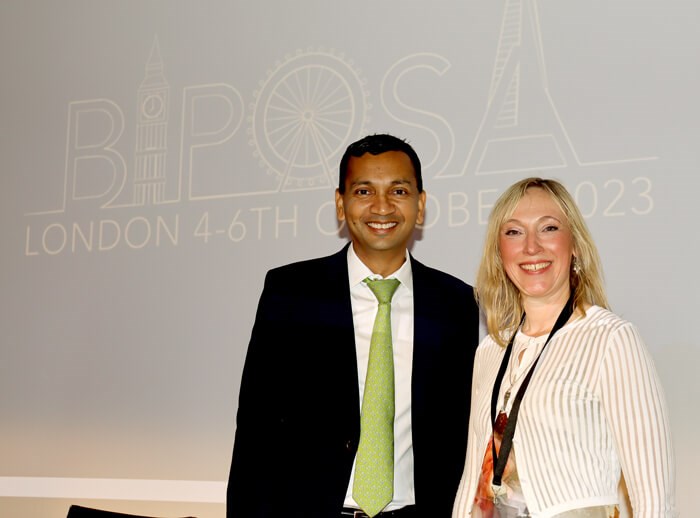The British and Irish Paediatric Ophthalmology and Strabismus Association (BIPOSA) was set up in 2008 to merge two streams of ophthalmology, namely the practice of paediatric ophthalmology and the practice of strabismus (to include refracting in children, and strabismus in adults).
It gained registered charity status in 2017. BIPOSA has input from the British and Irish Orthoptic Society as well as the Royal College of Ophthalmologists Paediatric Ophthalmology subcommittee; both committee’s chairs are co-opted onto the BIPOSA Executive.
BIPOSA aims to promote education in these two vast and disparate areas, to improve patient care as well as to encourage ophthalmology trainees to take up training and promote research in these areas.
Membership is open to ophthalmologists, orthoptists and trainees, with the latter two groups paying a reduced rate. We have several prizes worth varying amounts from £200 to the £10,000 David Laws Travel Fellowship, aimed at bringing expertise (whether surgical or research techniques) back to the UK from overseas. We are always looking to support and encourage trainees into the specialty.
Over the last 10 years we have established the BIPOSA annual conference format into a three-day meeting, usually September or October, with subjects as wide apart as surgical retina, genetics, retinopathy of prematurity, uveitis, child protection, binocular vision, poor vision, cerebral visual impairment, multiply disabled children, nystagmus and of course strabismus management. BIPOSA’s meetings will be Northeast in October 2024, Cambridge 2025 and Liverpool 2026.
Membership benefits include access to the paed-ophth-strabismus discussion group, a closed forum aimed at discussing difficult case management theory. Given the huge variability of diagnoses, tapping into the expertise of many in the country is a fabulous resource.
BIPOSA developed (during COVID-19) and continues with the winter / spring webinar series. This has proved very popular for a mid-week 60 minutes when it’s cold and raining. The webinars are bi-monthly and free for those working in healthcare. Case presentations are popular, and we actively promote orthoptic presentations.
Notes from a large conference
Our conference this year was held at the superb Royal Society of Medicine in central London. Despite train and tube strikes, we attracted 536 delegates across the three days. We are delighted to welcome Miss Siobhán Ludden and Mr Neil Clough to give their perspective on BIPOSA 2023.

Miss Jo Hancox, Moorfields Eye Hospital and Mr Saurabh Jain, Royal Free Hospital.
Neil Clough, ST7, Paediatrics / Strabismus TSC
As a trainee doing a TSC in paediatrics and strabismus, my ears and eyes were wide open. ‘What a great conference’ was the type of phrase I kept hearing. BIPOSA not only showcased the breadth, depth and level of innovation within the subspecialty, but reminded me how many great people we have.
Highlights included deepening my understanding on current / future work on management of inherited retinal and optic nerve disease, where paediatric ophthalmologists will be central. Talks on surgical approach to nystagmus and thyroid eye disease demystified some concepts and boosted my confidence in what can be an intimidating area.
The keynote talks were brilliant; Professor Stacy Pineles’ work on the functional burden of paediatric eye disease brought home the importance of our work, and Mr Tony Vivian provided fascinating evolutionary theory and practical surgical advice on the superior oblique complex.
Our subspecialty is a social bunch, and we did not disappoint at the House of Commons and post-dinner karaoke (for some). There is concern over recruitment into our subspeciality, but if BIPOSA London reflects our future, it is bright.
Siobhán Ludden, Orthoptist, Children’s Health Ireland at Temple Street and Crumlin, Dublin
I was delighted to be able to attend BIPOSA 2023 and it was fantastic to hear from the range of speakers. In particular, an established virtual pathway for the increasing numbers of suspicious disc referrals involving orthoptists and ophthalmic photographers was presented, which has a positive impact on wait times for these very urgent referrals and streamlining paediatric clinics.
BIPOSA 2023 held its first dedicated orthoptic session, running parallel to the main programme. It was inspiring to hear from so many orthoptists undertaking various extended roles from academic research to orthoptist uveitis clinic and neuro-ophthalmology advanced clinical practitioner (ACP) orthoptist monitoring stable myasthenia gravis (MG)! There was an impressive presentation on orthoptist advanced practice in retinopathy of prematurity (ROP) screening using the Optos which not only highlighted advanced practice while maintaining patient safety, but it was also amazing to hear that this approach also had general benefits with patients noted to be less tachycardic! The importance of orthoptic evaluation in craniofacial patients was also highlighted – the valuable contribution an orthoptist can make to an multidisciplinary team (MDT) in surgical cases where a squint may develop postoperatively.
Overall, this was a fantastic session. It provided food for thought on the breadth of orthoptist advance practice opportunities as well as the value of and wider positive impact orthoptist advanced practice can have in the eye clinic.
BIPOSA is always looking for new ideas and members.
Contact us at: secretary@biposa.org
https://biposa.org/
COMMENTS ARE WELCOME





